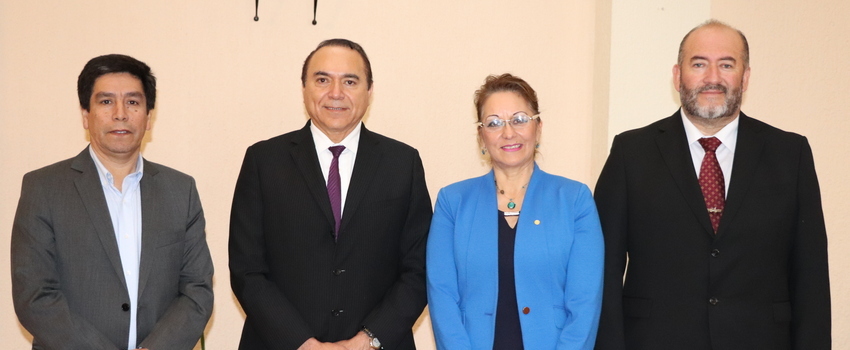
The academics Alejandra Torrejón, Eduardo Notte and Armando Mansilla make up the 2019 team of vice-rectors and will be responsible for accompanying the Rector in the management of the ULS.
The challenges of managing a complex state university with relevance and quality are varied and require management teams committed to the institutional development project and a comprehensive vision of quality that, as University of La Serena we seek to achieve.
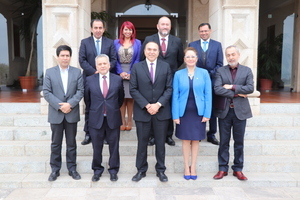 Hence, the election of the academics who make up the team of higher authorities is a decision that is defined in the highest collegiate bodies of ULS governance.
Hence, the election of the academics who make up the team of higher authorities is a decision that is defined in the highest collegiate bodies of ULS governance.
In this way, in the last sessions the candidates for the positions of Vice-Rector were presented, and the following appointments were ratified:
- Academic Vice-Rector, Dr. Alejandra Torrejón Vergara, academic at the Department of Education and until April 30, Vice-Rector for Economic and Administrative Affairs.
- Vice-rector for Economic and Administrative Affairs, Dr. Armando Mansilla Sunkel, academic of the Department of Civil Works Engineering.
- Vice-Rector for Research and Postgraduate Studies, Dr. Eduardo Notte Cuello, academic from the Department of Mathematics, who has remained in office since 2016, the date of creation of this macro-unit.
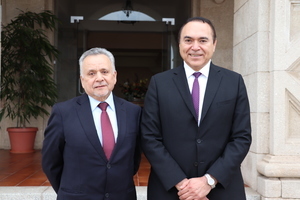 In the line of strengthening institutional capacities, the strategic support team for the Rectorate is strengthened, redefining the functions of the Directorate of Institutional Studies and Planning, headed by Dr. César Espíndola Arellano - which is now called the Directorate of Strategic Development and Quality - and creating the Strategic Communication Directorate, with the incorporation of the Mg. Carola Espinoza Orellana.
In the line of strengthening institutional capacities, the strategic support team for the Rectorate is strengthened, redefining the functions of the Directorate of Institutional Studies and Planning, headed by Dr. César Espíndola Arellano - which is now called the Directorate of Strategic Development and Quality - and creating the Strategic Communication Directorate, with the incorporation of the Mg. Carola Espinoza Orellana.
As part of the Rector's staff, there is also the Protocol Department and the Legal Advisory Department.
New challenges
Dr. Jorge Catalan Ahumada, ULS Academic Vice-Rector until April 30, 2019, received recognition from Rector Nibaldo Avilés, an occasion on which he shared the feelings of pride and satisfaction of having been part of the institution: “The University captivated me since the first day. I have had the privilege and honor of carrying out different tasks. I arrived very quietly and I want to leave the same way. In carrying out this high position of Academic Vice-Rector, I have endeavored to dignify the function in every act and decision; sometimes against the grain of some situations that work life presents. I have acted honorably and correctly. I don't know how many times I've been wrong, but I've done what I thought was right. I have been loyal to the institution, the authority and my peers because that is how they taught me to act (...) I don't have many more words and that is why I go to the theater to express what I feel: 'My academic life is coming to an end, forgive his many faults.
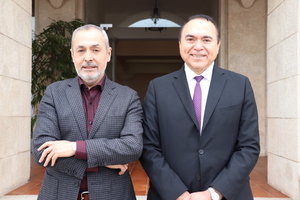 Another of the authorities who are taking new paths is Dr. Héctor Bugueño Egaña, who leaves the position of Director of Human Resources and resumes his academic life in the Department of Education, where he will continue to support management in coordination functions.
Another of the authorities who are taking new paths is Dr. Héctor Bugueño Egaña, who leaves the position of Director of Human Resources and resumes his academic life in the Department of Education, where he will continue to support management in coordination functions.
“I chose to be part of this government because I feel identified with the ethical investiture of those who make it up. I appreciate the trust you have given me over these years. I have always felt tremendously dignified treatment from our Rector. My commitment remains exactly the same and I will continue working so that the University continues to grow and enhance the Coquimbo Region,” said Héctor Bugueño.
Also leaving her position as Director of Liaison with the Environment and Extension, Dr. Catalina Cvitanic Abarca, assuming these functions is Mg. Carlos Varas Madrid.
Rector Avilés had heartfelt words of recognition and appreciation for the academics who are leaving their positions and who attended an event of camaraderie, presenting them with an institutional present, consisting of the ULS stamp book, as a sign of institutional respect for their contribution to the development and growth of the University.
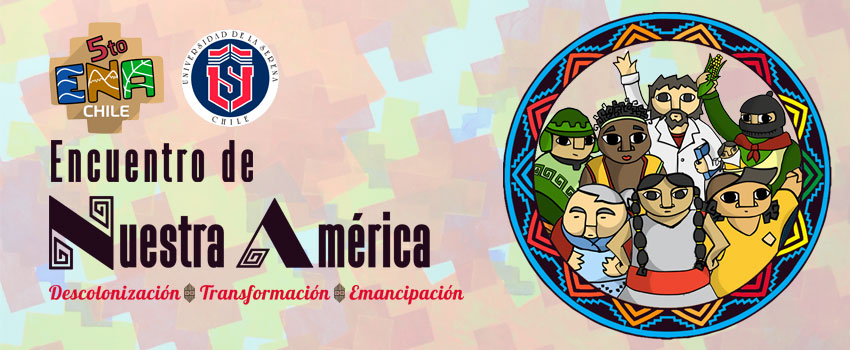

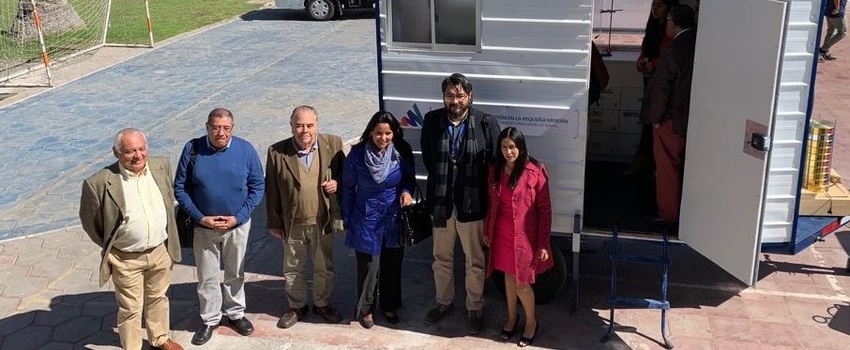
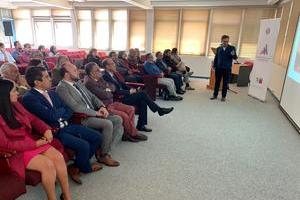 The project began in 2018, a period in which we worked together with mining union associations from La Higuera, La Serena, Andacollo, Ovalle, Punitaqui, among others; in addition to ENAMI and the Regional Secretary of Mining.
The project began in 2018, a period in which we worked together with mining union associations from La Higuera, La Serena, Andacollo, Ovalle, Punitaqui, among others; in addition to ENAMI and the Regional Secretary of Mining.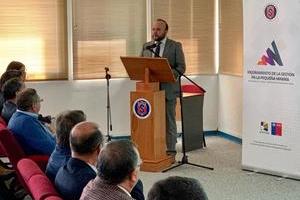 Catalina de la Cuadra, a graduate of Civil Engineering in Mining, wrote her Degree Report on the metallurgical laboratory, indicating that “I am very happy and proud to contribute to this great initiative, the idea is to later provide services in the small plants. miners, support them, analyze their processes and deliver the results so that they can improve their concentrates.”
Catalina de la Cuadra, a graduate of Civil Engineering in Mining, wrote her Degree Report on the metallurgical laboratory, indicating that “I am very happy and proud to contribute to this great initiative, the idea is to later provide services in the small plants. miners, support them, analyze their processes and deliver the results so that they can improve their concentrates.”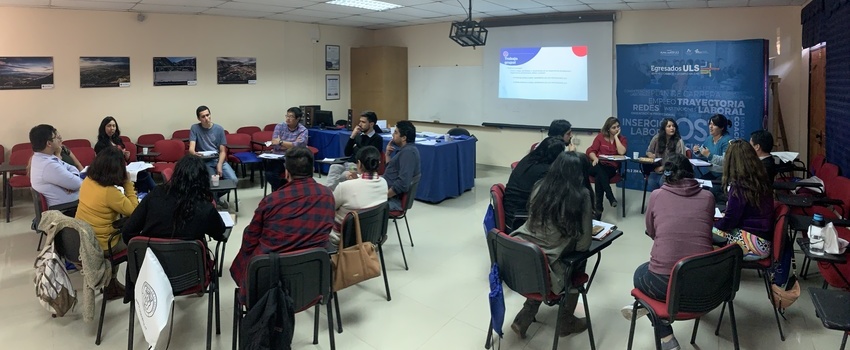
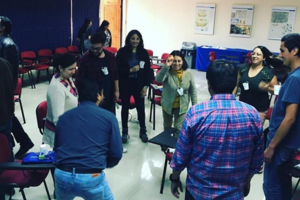 In this sense, the activity was framed in an instance of individual and collaborative work between ULS professors and professionals from the Graduate Monitoring Office, managing to identify and learn about those strengths, opportunities for improvement and requirements of the professors, with the purpose to nourish the various units of the University, as well as in the preparation of new workshops and actions of the OSE, which allow teachers to achieve greater development and professional performance.
In this sense, the activity was framed in an instance of individual and collaborative work between ULS professors and professionals from the Graduate Monitoring Office, managing to identify and learn about those strengths, opportunities for improvement and requirements of the professors, with the purpose to nourish the various units of the University, as well as in the preparation of new workshops and actions of the OSE, which allow teachers to achieve greater development and professional performance. 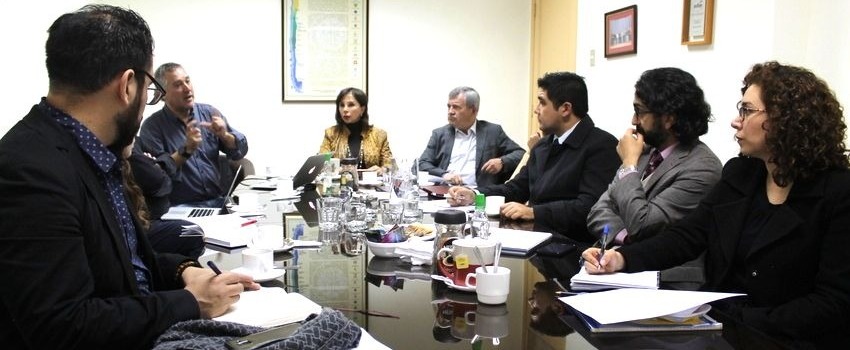

 Hence, the election of the academics who make up the team of higher authorities is a decision that is defined in the highest collegiate bodies of ULS governance.
Hence, the election of the academics who make up the team of higher authorities is a decision that is defined in the highest collegiate bodies of ULS governance. In the line of strengthening institutional capacities, the strategic support team for the Rectorate is strengthened, redefining the functions of the Directorate of Institutional Studies and Planning, headed by Dr. César Espíndola Arellano - which is now called the Directorate of Strategic Development and Quality - and creating the Strategic Communication Directorate, with the incorporation of the Mg. Carola Espinoza Orellana.
In the line of strengthening institutional capacities, the strategic support team for the Rectorate is strengthened, redefining the functions of the Directorate of Institutional Studies and Planning, headed by Dr. César Espíndola Arellano - which is now called the Directorate of Strategic Development and Quality - and creating the Strategic Communication Directorate, with the incorporation of the Mg. Carola Espinoza Orellana. Another of the authorities who are taking new paths is Dr. Héctor Bugueño Egaña, who leaves the position of Director of Human Resources and resumes his academic life in the Department of Education, where he will continue to support management in coordination functions.
Another of the authorities who are taking new paths is Dr. Héctor Bugueño Egaña, who leaves the position of Director of Human Resources and resumes his academic life in the Department of Education, where he will continue to support management in coordination functions.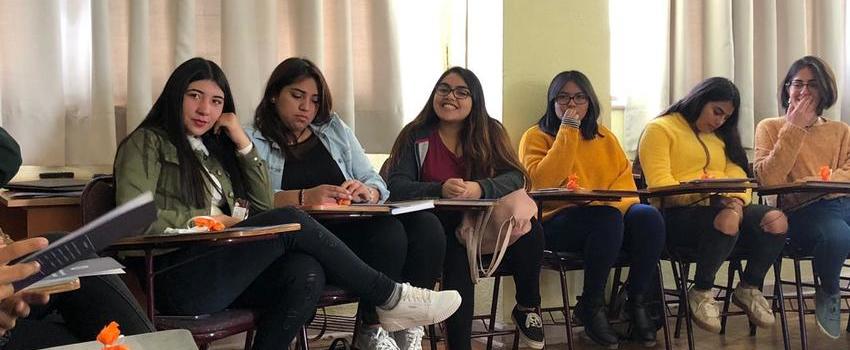
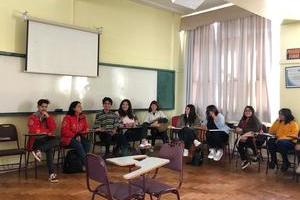 The students are currently in their fourth year of high school and during 2018 they had to overcome different selection stages to be part of this experience. They had the first class of 2019 last Saturday, when they were received by the professor, Dr. Karla Campaña, coordinator of the program, final year pedagogy students and students from the first generation of the QSPE.
The students are currently in their fourth year of high school and during 2018 they had to overcome different selection stages to be part of this experience. They had the first class of 2019 last Saturday, when they were received by the professor, Dr. Karla Campaña, coordinator of the program, final year pedagogy students and students from the first generation of the QSPE.